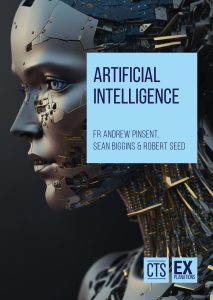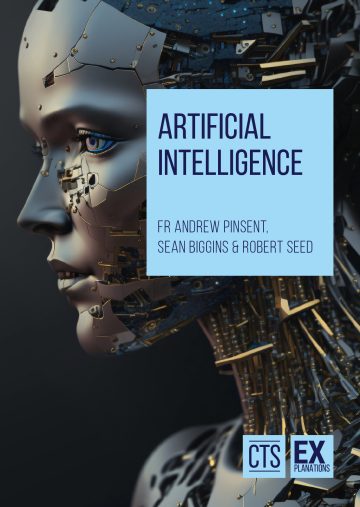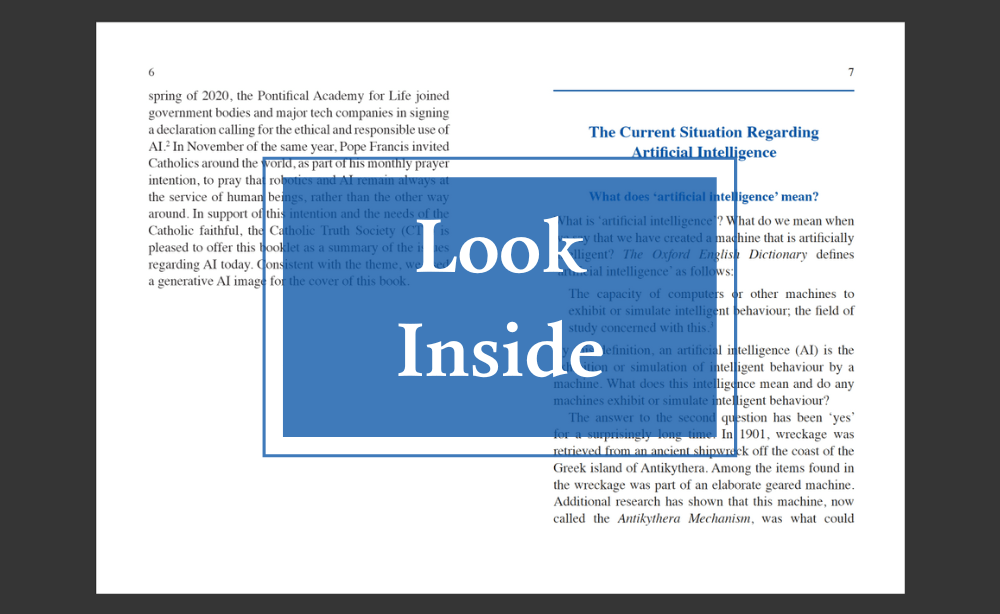
Artificial Intelligence
The better AI mimics human activity, the more questions it raises. Fr Andrew Pinsent offers answers in "Artificial Intelligence".
Artificial Intelligence
 Fr Andrew Pinsent, Sean Biggens, and Robert Seed
Fr Andrew Pinsent, Sean Biggens, and Robert Seed
£3.95 – A6 Paperback
We all use Artificial Intelligence, or AI, online. It determines our search engine results, curates our social media feed, and guides how we click through websites. Recent refinements in AI mean that it can compose text and produce images faster, and sometimes better, than humans. Chatbots are used for customer service and online diagnostic tools, and as social surrogates. The better AI mimics human activity, the more questions it raises: Is AI smarter than humans? Could it ever become human? Could it replace us? What do the advances in Artificial Intelligence mean for society, the Church, and the world?
In this book Fr Andrew Pinsent answers these questions and many more as he recounts the history of “intelligent machines”, evaluates the nature and impact of the present capabilities of AI, and offers some informed speculation about the future relationship between humans and artificial intelligence.
Scroll down to order now!
Artificial Intelligence
Catholic Questions and Answers About Artificial Intelligence
Are there morally good uses of programs like ChatGPT?
Certainly, there are innumerable good uses for ChatGPT and similar programs, and more good uses are being invented with great frequency. These programs can be used as a fast and versatile (though not 100% accurate) way of searching for information found on the internet. They can be used to cheaply perform basic customer service. They can be used to quickly generate computer code, and in the slightly longer-term future, many routine jobs may be carried out by AI.
Is it okay for me to tell chatbots personal details about myself and others?
There are risks involved in putting personal or private information into an AI of any type. Often, this information is used to train the AI, so any information you share can become a part of what that program can use when generating material for someone else. Additionally, chatbots are sometimes monitored or reviewed by humans to scrutinise their performance, so there is no guarantee that what you type won’t be read by another person. As with anything else involving the internet, never assume that what you type is secure or confidential, especially if you accepted the terms and conditions or privacy policies without reading them first.
I am really worried about AI. Is it possible to not use it at all in my daily life?
Some people working in certain kinds of jobs may use AI extensively. One of us, for example, spent years working in particle physics. Human beings, however, cannot study tens of thousands of particle collisions per second, so AI-type technology has been used for decades to filter automatically the very small percentage of collisions that might be of genuine interest for the advancement of physics. For most people, however, in most kinds of jobs, the impact of AI will most likely be commonplace but rather subtle for the immediate future. One example is the way in which the content of electronic messaging, including many social media interactions, is often prompted automatically by AIs. For example, when you hit ‘reply’ on an email, most platforms will immediately suggest a salutation and opening line. It is inevitable that this technology will become a part of modern life, just like other technological advances, such as moveable print, electric lights, microwave ovens and contactless payment. Caution with regard to some of the moral and privacy issues we have been discussing is warranted, but it is not necessary to reject AI technology because of these issues.
Is it possible to teach an AI to say the Rosary for me? If I program it, does it count as praying?
Actual prayer is a personal act whereby one addresses God and aligns with the will of God. This act requires the attention of one’s mind, the focus of one’s will, and somewhat secondarily, the alignment of one’s emotions. This act is impossible for an AI, for all the reasons outlined in the main text. Moreover, a failure to do this act oneself would be detrimental to one’s own spiritual health and flourishing, just as one cannot delegate the task of being a good friend to a machine. For all these reasons, an AI cannot pray as a substitute for one’s own prayer.
Could AI decide to harm humans?
In the strict sense, an AI cannot decide to harm humans. An AI could, however, be designed, by commission or omission, to act in a way that does cause harm. This fact is already true of weapons that are, to some degree, autonomous. A guided missile, for instance, makes calculations to ensure that its target is destroyed. It is likely that future weapon systems will be designed that include AI, say in a drone that makes tactical calculations about how to strike assigned targets. Alternatively, AI might be used to try to identify enemy combatants in a crowd, information that might be fed either to human soldiers or to automated weaponry. It is also at least possible that an AI with control of real- world systems might be designed with a reward function that, unintentionally, causes it to act in a way that harms humans. As noted in the main text, the problems in these unintended cases are due not to the malevolence of AI but to a failure of human intelligence.

